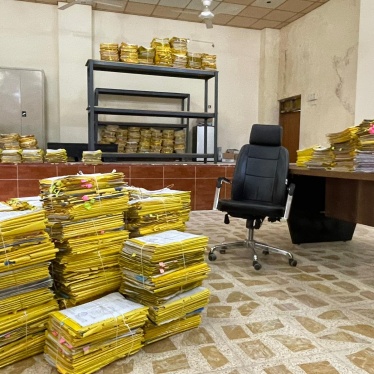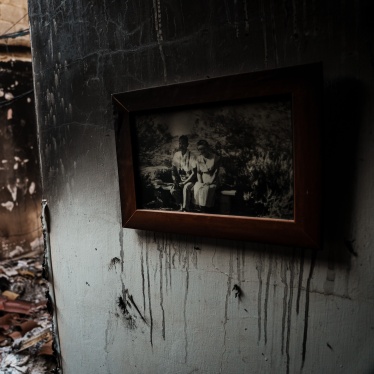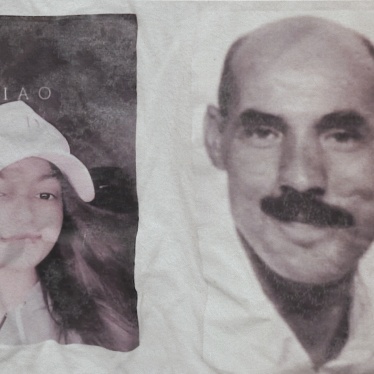His Excellency President Hamid Karzai
Office of the President of the Islamic Republic of Afghanistan
Islamic Republic of Afghanistan
Kabul, Afghanistan
Your Excellency:
Human Rights Watch is an independent international organization that monitors human rights in more than 90 countries around the world. We are currently preparing a report about the situation of Afghan nationals, including refugees, in Iran that documents a range of abuses and rights violations by Iranian authorities against Afghan nationals.
We write to inform you about our research on the human rights situation of Afghan refugees and migrants in Iran and to request meetings with relevant officials in your government to discuss our findings. We would be very grateful for the opportunity to hear the views of Afghan officials on the results of our research.
Between April 2012 and August 2013 Human Rights Watch conducted more than 80 interviews with Afghans who had been victims of abuses related to the Iranian government’s failure to respect international laws and standards which regulate claims for asylum and refugee status. Human Rights Watch also interviewed representatives of the United Nations, non-governmental organizations, and Afghan government officials familiar with these issues.
Below are some of our main findings:
- Lack of Fair and Transparent Asylum Procedures and No Right to Challenge Deportation to Afghanistan:
Afghans arriving in Iran today have virtually no opportunity to lodge asylum claims or register for other forms of protection based on country conditions in Afghanistan. Afghan asylum seekers should be able to lodge asylum claims with Iran’s Bureau of Aliens and Foreign Immigrant Affairs (“BAFIA”), the agency charged with processing refugee claims, but it is virtually impossible for newly-arriving Afghans to lodge claims due to the absence of no fair and transparent asylum procedures for Afghans. Other Afghans who have been in Iran for years or even decades are also unable to lodge claims. Afghans being deported from Iran, including people who may face persecution or serious harm upon return, are given no opportunity to challenge their deportation.
- Difficulties Retaining Refugee Status
Afghans registered as refugees under the Amayesh system face an increasingly complex process to retain that status, including frequent re-registration with relevant government agencies, a lack of official assistance for those with limited literacy who struggle to understand bureaucratic procedures, and onerous fees, which many poor refugees cannot afford. Afghans have told Human Rights Watch that the smallest technical errors, including mistakes during the registration process, can result in the permanent loss of refugee status.
- Concerns Regarding “Voluntariness” of Changing Refugee Status
Our research indicates that Iranian authorities have used numerous government initiatives in recent years, including the Comprehensive Regularization Plan (CRP), which provides temporary residency and work visas to undocumented foreign nationals, to convince Afghans to give up their protected refugee status. These programs may have resulted in the forced repatriation or return to Afghanistan of these refugees without their informed consent.
- Discrimination and Restrictions on Afghan Nationals
Afghan nationals in Iran face severe restrictions on freedom of movement, as well as arbitrary limits on access to education, employment, Iranian citizenship, and marriage rights. All foreign nationals are subject to travel restrictions in many areas of the country, but such restrictions are particularly burdensome for Afghans as compared to others. In some cases Human Rights Watch documented refoulement of refugees who were alleged to have violated such travel restrictions. Iranian rules restrict Afghans with legal immigration status, regardless of their educational or professional qualifications, to categories of employment that are menial and/or dangerous.
- Abuses During the Deportation Process
Afghans with or without legal status who are deported are routinely at risk of police abuses, including violence, theft, demand for unreasonable fees related to their deportation, forced labor during detention prior to their deportation, and poor conditions in detention facilities. A particular concern is the lack of protection for unaccompanied migrant children during the deportation process.
The report, which is still in draft form, contains many recommendations to the Iranian government for steps to remedy these abuses. It also contains a smaller set of recommendations to the Afghan government, the United Nations, and Afghanistan’s other international partners. The following are the recommendations currently contained in the report for the Afghan government:
To the Islamic Republic of Afghanistan:
- Make the status of Afghan migrants, including refugees, a priority in all talks with the Iranian government.
- Establish reception centers for unaccompanied children and improve family tracing to ensure that unaccompanied children are able to reunite with their families.
- Provide greater assistance to deported Afghans at all border crossings with Iran and expand the quantity and improve the quality of data collection from deportees to better track trends and possible human rights abuses.
- Increase financial and other assistance for poor Afghans who have returned from Iran and other countries.
- Take immediate steps to combat abuses by people smugglers and traffickers operating in Afghanistan.
- Urge the Iranian government to end abuses of Afghan refugees and migrants
- Continue to document and publicize abuses of Afghans in Iran through the Afghan Independent Human Rights Commission.
We would be very grateful to have the opportunity to discuss the report with relevant officials from your government and to hear their views on these issues as well as any steps they have taken or plan to take to address them. We would appreciate your responses to the questions below as well as any additional information you wish to provide us.
Human Rights Watch strives to reflect all perspectives in our research and looks forward to your response.
Thank you very much for your attention to this matter, and we look forward to hearing from you.
Sincerely,
Brad Adams
Asia Director, Human Rights Watch
cc:His Excellency Zalmai Rassoul, Minister of Foreign Affairs
His Excellency Dr. Jamaher Anwari, Minister of Refugees and Repatriations
1. What is the status of discussions between the Afghan government and the Iranian government on the issue of Afghans in Iran? Has the Afghan government specifically raised concerns with the Iranian government regarding the abuses detailed above? If so, and if such concerns have been raised in writing, we would be very grateful for copies of any relevant correspondence that could be shared.
2. We are aware of the Afghan government’s Solutions Strategy regarding Afghan refugees formulated jointly with the governments of Iran and Pakistan. What is the current status of the Solutions Strategy in terms of funds raised and implementation?
3. What plans, aside from the Solutions Strategy, has the Afghan government made to ensure protection and assistance for Afghan refugees and migrants in the years ahead?






